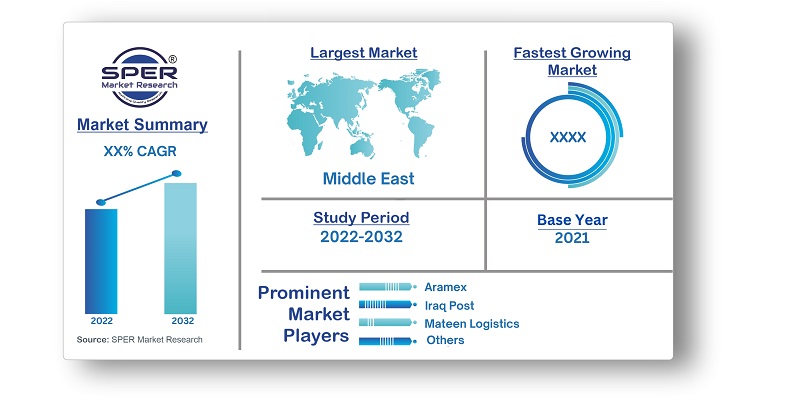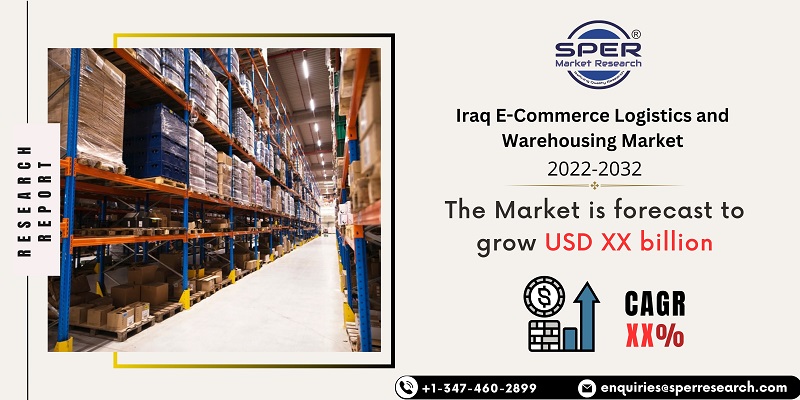
Iraq E-Commerce Logistics and Warehousing Market Growth, Share, Revenue and Future Outlook
Iraq E-commerce Logistics and Warehousing Market Size-By Product Category, By Delivery, By Volumetric Weight, By Payment, By Sourcing, By Gender, By Age Group- Regional Outlook, Competitive Strategies and Segment Forecast to 2032
| Published: Feb-2023 | Report ID: AMIN2336 | Pages: 1 - 102 | Formats*: |
| Category : Automotive & Transportation | |||
- Increasing Internet and Smartphone Adoption: The increasing use of the internet and smartphones has significantly helped the expansion of the e-commerce and warehousing markets. The number of online consumers has expanded as more people have access to the internet and use smartphones, generating a broader customer base for e-commerce enterprises. This has increased demand for online purchasing and expanded the e-commerce market's growth.
- Convenience and Accessibility: E-commerce's convenience and accessibility have been important drivers of market expansion. Online shopping allows customers to browse and buy things from the convenience of their own homes, at any time and from any location. The opportunity to purchase conveniently without visiting physical stores has enticed more customers to choose online shopping, resulting in the growth of the e-commerce market.


| Report Metric | Details |
| Market size available for years | 2019-2033 |
| Base year considered | 2022 |
| Forecast period | 2023-2033 |
| Segments covered | By Product Category, By Delivery, By Volumetric Weight, By Payment, By Sourcing, By Gender, By Age Group |
| Regions covered | Baghdad, Basrah, Erbil, Mosul |
| Companies Covered | Aramex, DHL, Iraq Post, Mateen Logistics, Sandoog |
- 3PL Logistics Companies
- E-Commerce Marketplace Platform
- Integrated Logistics Companies
- Logistics/Supply Chain Industry Associations
- Retail Companies
| By Product Category: |
|
| By Delivery: |
|
| By Volumetric Weight: |
|
| By Payment: |
|
| By Gender: |
|
- Iraq E-commerce Logistics and Warehousing Market Size (FY’2019-FY’2032)
- Overview of Iraq E-commerce Logistics and Warehousing Market
- Segmentation of Iraq E-Commerce Logistics and Warehousing Market By Product Category (Beauty and personal care, Beverages, Electronics, Fashion, Food, Furniture, Media, Toys, Hobby & DIY)
- Segmentation of Iraq E-Commerce Logistics and Warehousing Market By Delivery (More than 2 days, Next day, Same day)
- Segmentation of Iraq E-Commerce Logistics and Warehousing Market By Volumetric Weight (0 – 1 kg, 1 – 3 kg, 3 – 6 kg, Greater than 6 kgs)
- Segmentation of Iraq E-Commerce Logistics and Warehousing Market By Payment (Cash, Debit Card, Credit Card, E-wallets, Others)
- Segmentation of Iraq E-Commerce Logistics and Warehousing Market By Sourcing (Domestic, International)
- Segmentation of Iraq E-Commerce Logistics and Warehousing Market By Gender (Female, Male)
- Segmentation of Iraq E-Commerce Logistics and Warehousing Market By Age Group (15 – 35 years, 35 – 55 years, 55 and above)
- Statistical Snap of Iraq E-commerce Logistics and Warehousing Market
- Expansion Analysis of Iraq E-commerce Logistics and Warehousing Market
- Problems and Obstacles in Iraq E-commerce Logistics and Warehousing Market
- Competitive Landscape in the Iraq E-commerce Logistics and Warehousing Market
- Impact of COVID-19 and Demonetization on Iraq E-commerce Logistics and Warehousing Market
- Details on Current Investment in Iraq E-commerce Logistics and Warehousing Market
- Competitive Analysis of Iraq E-commerce Logistics and Warehousing Market
- Prominent Players in the Iraq E-commerce Logistics and Warehousing Market
- SWOT Analysis of Iraq E-commerce Logistics and Warehousing Market
- Iraq E-commerce Logistics and Warehousing Market Future Outlook and Projections (FY’2022-FY’2032)
- Recommendations from Analyst
1.1. Scope of the report1.2. Market segment analysis
2.1 Research data source2.1.1 Secondary data2.1.2 Primary data2.1.3 SPER’s internal database2.1.4 Premium insight from KOL’s2.2 Market size estimation2.2.1 Top-down and Bottom-up approach2.3 Data triangulation
4.1. Driver, Restraint, Opportunity and Challenges analysis4.1.1 Drivers4.1.2 Restraints4.1.3 Opportunities4.1.4 Challenges4.2. COVID-19 Impacts of the Iraq E-Commerce Logistics and Warehousing Market
5.1. SWOT analysis5.1.1 Strengths5.1.2 Weaknesses5.1.3 Opportunities5.1.4 Threats5.2. PESTEL analysis5.2.1 Political landscape5.2.2 Economic landscape5.2.3 Social landscape5.2.4 Technological landscape5.2.5 Environmental landscape5.2.6 Legal landscape5.3. PORTER’S five forces analysis5.3.1 Bargaining power of suppliers5.3.2 Bargaining power of Buyers5.3.3 Threat of Substitute5.3.4 Threat of new entrant5.3.5 Competitive rivalry5.4. Heat map analysis
6.1 Iraq E-Commerce Logistics and Warehousing Manufacturing Base Distribution, Sales Area, Product Type6.2 Mergers & Acquisitions, Partnerships, Product Launch, and Collaboration in Iraq E-Commerce Logistics and Warehousing Market
7.1 Beauty and personal care7.2 Beverages7.3 Electronics7.4 Fashion7.5 Food7.6 Furniture7.7 Media7.8 Toys, Hobby & DIY
8.1 More than 2 days8.2 Next day8.3 Same day
9.1 0 – 1 kg9.2 1 – 3 kg9.3 3 – 6 kg9.4 Greater than 6 kgs
10.1 Cash10.2 Debit Card10.3 Credit Card10.4 E-wallets10.5 Others
11.1 Domestic11.2 International
12.1 Female12.2 Male
13.1 15 – 35 years13.2 35 – 55 years13.3 55 and above
14.1 Iraq E-Commerce Logistics and Warehousing Market and Market Share by Region (2019-2025)14.2 Iraq E-Commerce Logistics and Warehousing Market and Market Share by Region (2026-2032)14.3 Baghdad14.4 Basrah14.5 Erbil14.6 Mosul
15.1 Aramex15.1.1 Company details15.1.2 Financial outlook15.1.3 Product summary15.1.4 Recent developments15.2 DHL15.2.1 Company details15.2.2 Financial outlook15.2.3 Product summary15.2.4 Recent developments15.3 Iraq Post15.3.1 Company details15.3.2 Financial outlook15.3.3 Product summary15.3.4 Recent developments15.4 Mateen Logistics15.4.1 Company details15.4.2 Financial outlook15.4.3 Product summary15.4.4 Recent developments15.5 Sandoog15.5.1 Company details15.5.2 Financial outlook15.5.3 Product summary15.5.4 Recent developments
SPER Market Research’s methodology uses great emphasis on primary research to ensure that the market intelligence insights are up to date, reliable and accurate. Primary interviews are done with players involved in each phase of a supply chain to analyze the market forecasting. The secondary research method is used to help you fully understand how the future markets and the spending patterns look likes.
The report is based on in-depth qualitative and quantitative analysis of the Product Market. The quantitative analysis involves the application of various projection and sampling techniques. The qualitative analysis involves primary interviews, surveys, and vendor briefings. The data gathered as a result of these processes are validated through experts opinion. Our research methodology entails an ideal mixture of primary and secondary initiatives.



Frequently Asked Questions About This Report
PLACE AN ORDER
Year End Discount
Sample Report
Pre-Purchase Inquiry
NEED CUSTOMIZATION?
Request CustomizationCALL OR EMAIL US
100% Secure Payment






Related Reports
Our Global Clients
Our data-driven insights have influenced the strategy of 200+ reputed companies across the globe.




















